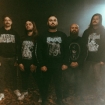It's common knowledge by now to anyone in the metal community that Manuel Gagneux, the mastermind behind Zeal & Ardor, originally started his project on something of a dare.
The musician had posted on a 4chan message board that he was looking for suggestions of genres he could mash up together to create a new song. One anonymous hater threw out a particularly inflammatory pairing: black metal and "n*gger music," as Gagneux explained to us last year.
He accepted the challenge (as an "ultimate fuck-you" to the racist troll), and the results eventually led to Zeal & Ardor's debut, Devil Is Fine — the first, and, to date, only, entry in the black metal/spirituals genre. The album received across-the-board accolades from both critics and metal fans upon its release in 2017, as much for the controversial conceit at the heart of it as for the fact that the Swiss-born Gagneux actually pulled the whole thing off, displaying not only an impressive understanding and grasp of both styles of music, but also an ability to combine the two in an incredibly listenable and engaging manner.
Now a year or so on, Gagneux has not only transformed Zeal & Ardor into a fully stocked touring outfit, he's also put the finishing touches on a second full-length studio album. And if there was any possibility he might back off from the heavy themes and subject matter of Devil Is Fine, look no further than the new album's Billie Holiday–referencing title, Stranger Fruit.
"It's kind of a continuation of the thoughts [in the poem that was used as the basis for the lyrics in Holiday's song, "Strange Fruit"]," Gagneux says, on the phone with Revolver from his home in Basel, Switzerland. "Of strange fruit, of people hanging, and, by extension, of people being shot or dying. It's not that happy of an idea, all in all. But that's kind of the times we live in."
In the following interview, Gagneux opens up about the making of Stranger Fruit, from the unexpected musical influence of outsider artists like Tom Waits and Wendy Carlos, to the lyrical parallels between historical traumas and modern-day suffering. He also talks about confronting accusations of cultural appropriation in his music, whether he considers what he does to be "metal," and discusses his childhood in Switzerland, from the "awful" name of his first black metal band to what, exactly, an alphorn sounds like when you blow into it.
Finally, Gagneux reveals just what went on with the eight fans who were branded with Zeal & Ardor insignias at his band's shows. "I can tell you it hurts like a motherfucker," he says. "It's not fun!"
WERE YOU TRYING TO DO SOMETHING DIFFERENT ON STRANGER FRUIT OR DO YOU SEE THE ALBUM AS SOMETHING OF A CONTINUATION OF THE MUSICAL AND LYRICAL THEMES OF DEVIL IS FINE?
MANUEL GAGNEUX I wanted to do a continuation. Although it was important to me to have a little bit of ambiguity as to whether the lyrics are playing in historical times or current times. For instance, a song like "Servants," you can't be quite sure if it's a song about a slave revolution or if it's actually an appeal to the current political climate that we're enjoying at this time.
TO THAT END, IT WOULD BE DIFFICULT TO LISTEN TO MUSIC — OR TO ABSORB ANY TYPE OF ART, AS IT WERE — THAT FOCUSES ON SUBJECTS LIKE RACISM AND CLASS DISPARITY AND NOT DRAW PARALLELS TO MODERN-DAY EVENTS.
Yeah, exactly. And actually, I think the fact that what I'm doing can have that parallel to current times is pretty abysmal, and speaks volumes. Also, frankly, if I were making the music I make and not even thinking about current times, that would just be kind of cowardice, and kind of wrong. Because I am using these elements and I think it's only appropriate to give context to them.
HAVING IN MIND THAT AWARENESS OF HOW THE MUSIC IS GOING TO BE ABSORBED AND INTERPRETED BY YOUR AUDIENCE, HOW DID YOU FEEL ABOUT HOW YOUR FIRST ALBUM WAS RECEIVED? DID YOU THINK THAT PEOPLE PAID TOO MUCH ATTENTION TO THE CONCEIT AT THE HEART OF IT, RATHER THAN JUST LISTENING TO THE MUSIC FOR WHAT IT WAS? DID YOU FEEL IN SOME CORNERS IT WAS JUST WRITTEN OFF AS A GIMMICK?
I felt all of those things, actually. But at the end of the day people are going to make up their own minds and that's something I have no control over. And as for the gimmick thing, you know, you'd be forgiven for thinking it was just a gimmick! I think it was up to me to disprove that. And that's what I'm trying to address with the second record.
CAN YOU GIVE AN EXAMPLE?
Sure. With something like "Gravedigger's Tale," I was listening to a lot of old blues, and all the old Alan Lomax recordings again. But with the first record I kind of tried to copy that style, and sonically even tried to steal what I could steal. But this time around I tried to explore that kind of music with my own voice, if that makes any sense. It's not as much of the copycat act. And thematically I chose the gravedigger because they're something that every culture has — someone who's dedicated to tending to the dead. Apart from the whole metal aesthetic of it, I think they're kind of unsung heroes. Because they just take every person as they are. There's no judging as a gravedigger. It's just a body.
WHEN IT COMES TO ZEAL & ARDOR, PEOPLE ALWAYS TALK, NATURALLY, ABOUT THE BLACK METAL AND SPIRITUAL ASPECTS. BUT IS THERE ANY MUSIC OUTSIDE OF THOSE TWO REALMS THAT YOU FEEL HAS REALLY INSPIRED YOU IN THIS PROJECT?
Yeah. I'm really inspired by Tom Waits. And the thing that sticks with me the most about him is he's a really great set-dresser. As soon as you hear a song of his you're kind of transported into his world. And then you can find your own narrative within that, like, rickety old house you feel like you're in. That's something that has always impressed me and stuck with me. I love the guy.
IT'S FUNNY YOU SHOULD BRING UP TOM WAITS. HE IMMEDIATELY CAME TO MIND THE FIRST TIME I HEARD A SONG LIKE "WHAT IS A KILLER LIKE YOU GONNA DO HERE?" FROM THE FIRST ALBUM.
Yeah! Although "What Is a Killer Like You Gonna Do Here?" is, like, straight-up copycat, in all honesty. [Laughs] I try to distance myself a little from that now.
ONE DIFFERENCE I NOTICED WITH STRANGER FRUIT IS THAT IT SEEMS LIKE THERE'S MORE SYNTH WORK THIS TIME AROUND. WERE YOU TRYING TO PUSH OUT ON THE INSTRUMENTATION?
Yeah. I was listening to a lot of Wendy Carlos — she was the person who did the A Clockwork Orange soundtrack. She was a synth pioneer, and she would transcribe all these classical pieces and arrange them for synthesizer. I was also listening to a lot of [French composer] Erik Satie, the famous piano player. I guess I just wanted to try those two out in combination.
SPEAKING TO THE DIVERSITY OF YOUR MUSIC TASTES, THERE'S A GREAT YOUTUBE PERFORMANCE OF YOU WITH YOUR OTHER PROJECT, BIRDMASK, DOING EN VOGUE'S "DON'T LET GO." WHY DID YOU CHOOSE TO COVER THAT SONG?
[Laughs] Actually, they had a list of songs we were allowed to cover, because they had the rights to them or some weird thing [the performance was for Indaba Music's Suite 268 series]. I just thought it was such a girly girl-power song, and for a dude to sing it would just be hilarious.
YOU DID A NICE JOB.
Thank you! It was good fun.
ARE YOU STILL DOING BIRDMASK?
Yeah, man. I just had a gig last Friday. When I'm kind of strapped for cash I do those gigs. Because here in my hometown people kind of like it. I can do a gig for tips and get by for a month on that. Which is pretty nice.
IT'S PROBABLY EASIER TO GET TIPS DOING THAT KIND OF MATERIAL THAN, SAY, "GRAVEDIGGER'S CHANT."
Sadly, yeah. But I like doing both.
I WOULD IMAGINE THAT THE WAY ZEAL & ARDOR IS RECEIVED IN SWITZERLAND IS PROBABLY DIFFERENT FROM HERE IN AMERICA, SINCE THE SWISS DON'T HAVE THE SAME SORT OF CULTURAL BAGGAGE THAT GOES ALONG WITH THE SPIRITUAL MUSIC SIDE OF WHAT YOU DO.
Yeah, that's exactly it. I think people here enjoy the music at face value more, because they're not confronted with these issues and themes normally, so they don't have the context for it. But I think I'm received far closer to my intent in the U.S. and the U.K. than I am here. Because there's a huge cultural … not discrepancy, but there's a gap, I guess.
DO YOU ENCOUNTER A LOT OF PEOPLE ACCUSING YOU OF CULTURAL APPROPRIATION?
A few. But funnily enough it's usually more from the black metal side of things.
YOU MEAN BLACK-METAL FANS THAT FEEL WHAT YOU'RE DOING ISN'T PURE?
Yeah, exactly. Or kvlt or whatever. [Laughs] I mean, black-metal people are so defensive of their music. And it's kind of a paradox because it used to be this really aggressive, really experimental fringe thing and now there's all these rules you have to adhere to. It's kind of counter to the point or the core philosophy of black metal, in my opinion at least. And I mean, I love the black-metal sound. But I'd be bored if I had to make it exactly like that, you know? So I just kind of disregard it.
DO YOU EVEN SEE WHAT YOU'RE DOING AS METAL?
No. I acknowledge that since the elements are there it's easy to put us into that category. But we also play different festivals that are more indie or even pop-oriented. And it goes over really well with those audiences. And, yeah, at first there's this initial confusion. But come the second song you see their heads bopping and the people kind of grooving. That takes over from the shock. So, no, I wouldn't really see us as a metal group.
AS FAR AS PLAYING LIVE, I HAVE TO ASK ABOUT AN ARTICLE THAT CAME OUT RECENTLY THAT TALKED ABOUT FANS BEING BRANDED WITH A ZEAL & ARDOR INSIGNIA AT YOUR SHOWS. DID YOU ACTUALLY WITNESS THAT HAPPEN?
Oh, yeah. And I asked every single person beforehand, "Are you sure you want to have this?" I explained the intent of the branding, which was that, first of all, for historical reasons you wouldn't want to have this branding. And second of all, you wouldn't want to have this branding because you shouldn't blindly follow anyone. You shouldn't adhere to a cult of personality. But these people were still like, "Yeah, man!" And they were sober, mind you. [Laughs]
DID THIS HAPPEN AT SHOWS IN EUROPE?
This was in Europe. We haven't done it in the States. I think lawyers in the U.S. are kind of twitching at the fingers even hearing about it.
IT'S PROBABLY NOT SOMETHING YOU'D WANT TO OFFER AT SHOWS HERE.
Since I'm talking to media, no. Of course not! [Laughs]
WAS THE BRANDING YOUR IDEA?
Actually, no. It was our merch guy. He said, "Dude, you should totally make a branding! I'll forge it for you." Then we kind of mulled it over, the idea of it, what it could mean. And I said, "That could work. Let's do it!"
WERE THE EIGHT PEOPLE THAT GOT BRANDED HAPPY TO HAVE DONE IT?
Yeah. They were really proud of it. And I have to say, one of those eight people is actually playing guitar in my band.

NOW YOU CAN'T KICK HIM OUT.
[Laughs] It would be, like, the ultimate dick move. So no, I don't think I can do that. Also I love him to death.
I KNOW THAT YOU LIVED IN NEW YORK FOR A WHILE. BUT DID YOU GROW UP STRICTLY IN SWITZERLAND?
I did.
WAS METAL BIG THERE WHEN YOU WERE A KID? WERE THERE A LOT OF CELTIC FROST AND CORONER FANS AROUND?
You know, those bands actually do far better outside of Switzerland. I mean, of course they have a following here because they're legendary. And two weeks ago I saw a Triptykon show here, and it was a packed show. Although I think they would sell out bigger venues in Germany or Scandinavia. But yeah, there is a metal scene here. It's not like Scandinavia where you would walk into a supermarket and hear, like, fucking Cannibal Corpse going at it. It's still very much a subculture thing. But I was really into it as a teen.
WHAT KIND OF STUFF?
Mostly grindcore and technical and melodic death metal. That super-fast nerdy stuff was my jam.
DID YOU PLAY IN METAL BANDS?
Yeah. In terrible bands. My first band was a black-metal band. And dude, we sounded awful! Then the second one was a more experimental, let's-try-shit-out-even-if-it-doesn't-sound-good kind of band. And after that I just made music for myself.
WHAT WAS THE WORST BAND NAME YOU HAD?
The worst band name was Hellelujah — with an "E" instead of an "A." [Laughs] That's pretty awful! And the logo was, like, branches just kind of bunched up.
ANY CORPSE PAINT?
No. I don't think we ever did the corpse paint stuff. But, you know, it's never too late, man!
YOU'VE TOLD THE STORY MANY TIMES ABOUT HOW ZEAL & ARDOR BASICALLY CAME ABOUT FROM A CHALLENGE ON 4CHAN. BUT NOW IT'S BECOME YOUR PRIMARY CONCERN. IS IT A CONCEPT THAT IN YOUR MIND CAN EXIST FAR BEYOND EXPLORING THAT INITIAL MASH-UP IDEA? OR WILL IT EVENTUALLY COME TO AN END?
I mean, as long as there's still room for experimentation I'll still be doing this. But as soon as I hit the point where I feel I'm milking it or just kind of phoning it in, I mean, nobody wants to hear that. I'll move on to something different at that point. But I'm not quite there yet.
HAVE YOU EVER THOUGHT ABOUT MASHING UP OTHER TRADITIONAL MUSIC WITH BLACK METAL? I WOULD ASSUME THERE'S SOME SORT OF TRADITIONAL SWISS FOLK MUSIC.
There is. But it's, like, yodeling stuff. And we also have something called an alphorn, which is a huge-ass trumpet made out of wood. It's like ten feet long, and people blow into it and it sounds like farts.
ALPHORNS AND YODELING. THAT MIGHT BE A GOOD DIRECTION FOR ALBUM NUMBER THREE.
It might be. [Laughs] Hold on tight, man!








